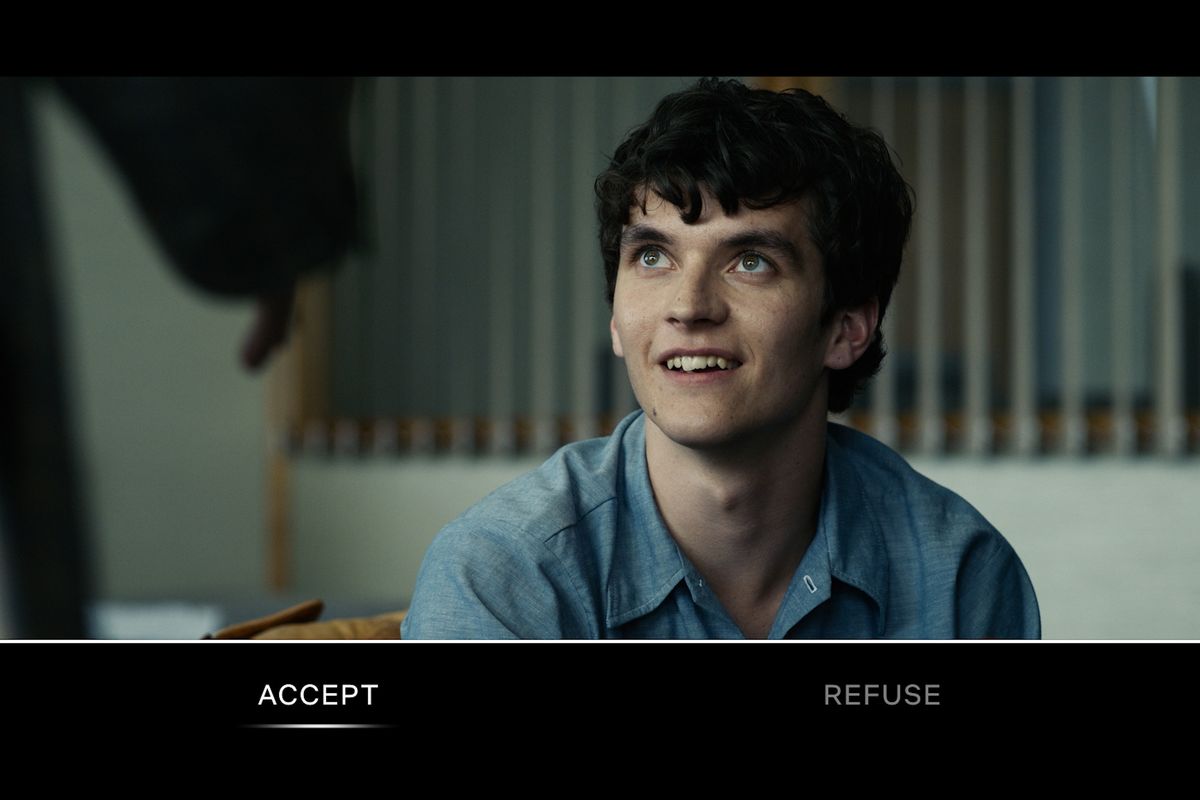
In the wake of Telltale Game’s closure, there is certainly something of a vacuum for engaging interactive fiction. That is not to say the genre is completely dead, as other series like Life is Strange and the work of Quantum Dream are still being released. But still, the absence of one of the genre’s giants is palpable. Although the latest Black Mirror project was in development far before Telltale’s demise was inevitable, Netflix has inadvertently taken a crack at filling the void by releasing their own twist on this type of game in the form of Bandersnatch and Minecraft: Story Mode.
Belonging to the Black Mirror series, Bandersnatch is a choose your own adventure game in which you play as a young programmer named Stefan Butler, who is attempting to adapt his favorite book into a branching narrative game. At several points in this interactive film, you are given the ability to make choices. These choices potentially cause the story to branch, or more often than not, lead to dead ends. As Stefan inches closer and closer to completing his game, things turn nefarious. He finds a publishing company but becomes increasingly mentally unstable as his product progresses. He begins to question if his actions are his own, or some unknown entity is controlling him.

The film’s greatest and most apparent failing is that it is completely obsessed with its nature as a meta-textual construct. One of the core aspects of the story is that the author of the book Stefan is adapting was a man who went insane and decapitated his wife due to the nature of the stories he was creating. He claimed that our choices don’t matter, as there are a branching array of decisions that stretch infinitely, each different decision spawning a parallel universe. He also claimed that free will doesn’t exist, our actions a result of some foreign being that controls us.
While ideas of free will and parallel universes are interesting in their own right, here they are so tightly coupled to the specific nature of this branching narrative, that they lack any real impact. Essentially the film isn’t asking us to consider our own notions of free will, it’s merely pointing out that the characters in the story we’re playing have none. Games have already gone through a light modernism phase where meta-stories that challenge the nature of games have been explored. From the Stanley Parable, to Bioshock, to Icey, there are a plethora of titles that consider the viewpoint of those that exist in these stilted virtual worlds. And despite the fact that this concept has been explored thoroughly and quite well in many cases, this wouldn’t necessarily negatively impact Bandersnatch, as there is undoubtedly more to be said on the subject. However, this film doesn’t quite work as metafiction or as a regular narrative because its self-referential elements are shallow and its characters are almost universally poorly acted and written.
It’s likely that Stefan’s somewhat alienating presence is an intentional choice, showing how even before his downward spiral he feels like someone who has been placed in a world he doesn’t belong. But, that doesn’t forgive the fact that almost every conversation he has with another person feels flat and unconvincing. For instance, the conflict he has with his father would feel more compelling if it resembled any semblance of a real relationship, good or bad. Instead, we have Stefan’s blank and sometimes confused face, constantly hurtling towards inevitable doom because the only actual endings here are all just different gradients of dismal. Beyond the acting, our protagonist feels like a hodgepodge of lazy cliches concerning mental illness. While during his extended coding-sprees, his lethargy and exhaustion feel like a natural reaction to his circumstances, the gonzo conclusions to the story delve into thoroughly cartoonish territory.

But there are a few bright spots to be found. One of the key supporting characters is Colin, a famous game designer who is Stefan’s idol. His quippy comments on the nature of coding and programming are quite relatable (I will forever use the term “In the Hole” from this point on), and his explanations of philosophical theories best summarize the wavelength of conspiratorial insanity that defines this film’s logic. His desperate plea concerning the ultimate thematic implications of Pac-Man are both hilarious, and weirdly convincing. Additionally, sometimes the film’s nature as a branching narrative actually plays in its favor. When the different branching paths interact with one another, it further intensifies the sensation that this is all an unsettling fever dream. One branch that spawns off one of these paths presents a precisely unnerving scenario, elevated by hallucinogenic coloring choices and the cold vernacular of governmental jargon. And ultimately, the interactive nature of this story partly bails out a lot of the weak writing, make the proceedings a mildly fun gimmick if nothing else.
All things considered, Bandersnatch is a bit of an oddity. It doesn’t fully utilize its premise as an interactive story, as its constant allusion to the fact that it is a branching narrative makes it difficult to be invested in your decisions. Ironically, the significant degree of variance in the endings makes things dramatically unsatisfying. The ending which feels like it makes the most sense in the context of the story has a terrible message, mimicking the worst of Black Mirror’s cynical conclusions. However, the outright goofiness of many of these branches, combined with the strength of the gimmick means there is some entertainment value to be had. While there have been a few examples of interactive films in the past, and there are many examples of branching narratives in games, there is some leniency to be had with one of Netflix’s first forays into the form. I imagine this is what many of the nascent films of the early 20th century were like to early filmgoers, with pictures like The Great Train Robbery that entertained mostly through novelty alone. However, the main issue is that Bandersnatch isn’t the first of its kind in the grand scheme of things, and while it is an intriguing experiment, it is neither a great film or a great game. But hey, maybe they’ll get it in the next run.
Rating: 2.5/5






